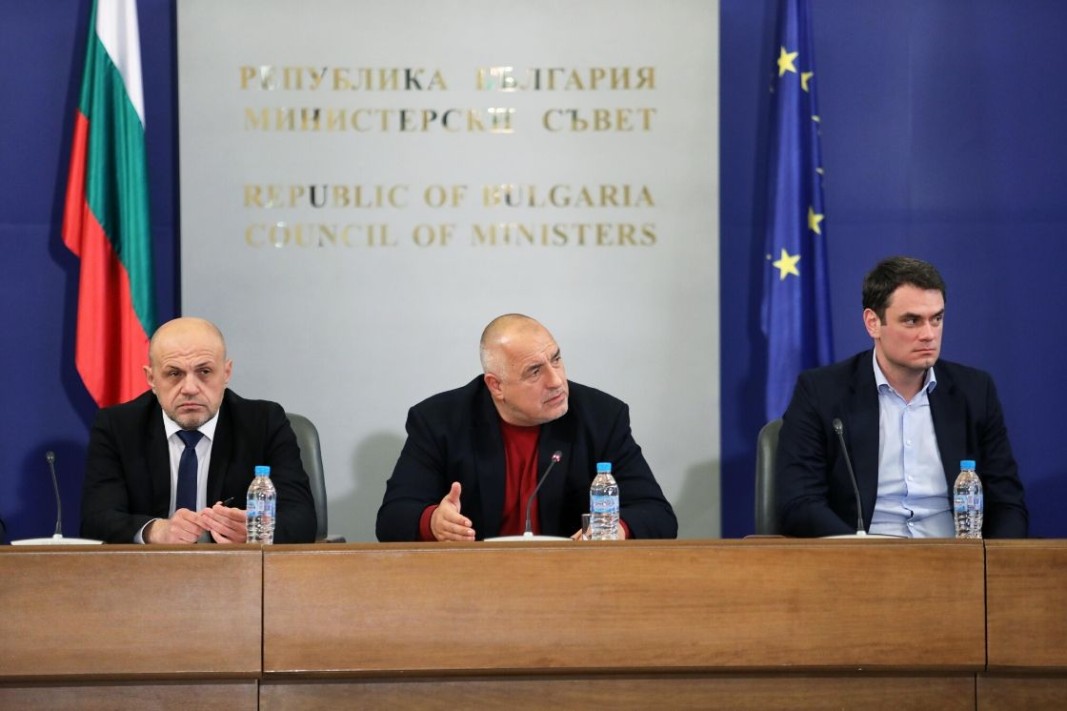After days of difficult negotiations between the government on the one hand, and the social partners represented by the trade unions and the employer organizations on the other, the government adopted a package of measures to compensate for the losses businesses are incurring as a result of coronavirus and to prevent mass lay-offs of workers and staff. The package will cost society EUR 500-750 million /1-1.5 billion Leva/, and, as PM Boyko Botissov said, this sum will not be enough. Be as it may, this is money that was not envisaged in the country’s budget, that is why the government decided to urgently update it.
The draft bill for updating the national budget envisages an increase in the money for the State and Social Security Fund by EUR 700 million /1.43 billion Leva /.The deficit is expected to go up, reaching EUR 1.79 billion /3.5 billion Leva / or 2.9% of the GDP. A rise in the government debt up to EUR 5.113 billion /10 billion Leva / is also envisaged if the crisis worsens more than envisaged.
The government’s plan to counter unemployment, now popularly known as the “60/40 plan”, envisages the payment, by the state in the course of 3 months, of 60% of the insurable earnings of workers and employees in companies operating in the sectors of the economy designated as the hardest hit. These include retail trade, land transport, passenger and air transport, the hotel and restaurant business, travel agencies and operators, pre-school education (the private sector), artistic and creative activities and sports, entertainment. Companies in other sectors where there is a drop in net revenues of over 20% as a result of the crisis, compared to March 2019, will also be rendered assistance. The remaining 40% of salaries will have to be covered by the employers, they will also have to cover the social security contributions for the full monthly salary. Employers from towns and villages hit hardest by the government’s anti-crisis measures will also receive assistance. It is believed that around 300,000 people will be able to avail themselves of these measures. As the “60/40 plan” is, essentially, state aid, the decision for its implementation has been sent to the European Commission for approval, which is expected to become fact within 24 hours, as PM Borissov made it clear.

Deputy Prime Minister Tomislav Donchev warned businesses that if they scatter their staff now, their return to work when the economy starts picking up afterwards will be a slow process. We want to save ourselves this shock. We are thinking of the employers but most of all we are thinking of the workers, Tomislav Donchev said. Businesses had many objections to the 60/40 plan, stating that it is not going to help employers, nor will it prevent the spread of unemployment. According to former deputy finance minister Lyubomir Datsov, these measures are not going to have an effect on real business and unemployment.
The rescue package also envisages interest-free express bank loans of EUR 750 /1,500 Leva/ for natural persons forced to take unpaid leave because of the coronavirus crisis, with a repayment period of up to 24 months. Recipients will also be given a 6-12 month grace period in which they will be exempt from making repayment installments. Calculations show that around 130,000 people will be able to avail themselves of these loans.
Closure of enterprises, lay-offs, compulsory leave, salary cuts have all become a daily occurrence. 1,300 people register at employment offices every day, the websiteMoney.bg writes, adding that before the crisis the newly registered unemployed were half that number.
The finance minister said he expected unemployment in Bulgaria to go up by 2 percentage points. We are ready to assist unemployment benefits via the Operational Programme "Human resources development", said Minister of Labour and Social Policy Denitsa Sacheva. Before the epidemic, workers were in high demand and employers offered tempting salaries, social packages and working conditions. At the end of last year unemployment dropped to a record low - 4.1%. In the fourth quarter of 2019, the number of unemployed in the country stood at 138.500, now they are up to 213,700. In the time since a state of emergency was put in place on 13 March, 9,909 have been left out of a job.
Photos: BTA and BGNES
As of October 1, the base interest rate in Bulgaria is 1.81%. The rate has been declining for the 12th consecutive month, this time by 0.01% compared to September 2025. The base interest rate in Bulgaria, which is used to calculate the annual..
Bulgaria’s accession to the eurozone will reduce transaction costs with key trade and investment partners, according to the annual U.S. State Department report on the investment climate in the country, reported BGNES. The report emphasizes that..
Less than 100 days remain until Bulgaria joins the eurozone, and this is another reason to talk about the incomes of people in Bulgaria, about the Bulgarian economy, about foreign investments and about the domestic labour market which reacts the..
In view of the country's declining population, the Fiscal Council recommends that the government take savings measures in the 2026 state budget...
The two largest trade unions in Bulgaria - the Confederation of Independent Trade Unions in Bulgaria and the Confederation of Trade Unions "Podkrepa" -..

+359 2 9336 661
